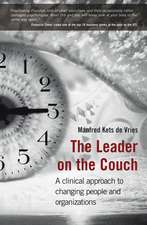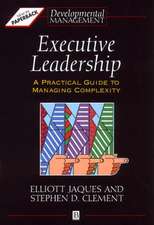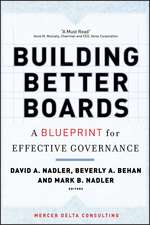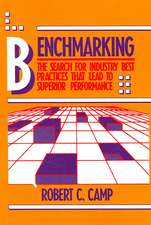Executive Development and Organizational Learning for Global Business
Autor Erdener Kaynak, Robert M Fulmer, J. Bernard Keysen Limba Engleză Paperback – 31 mar 1998
Considered a “must-have” handbook for development managers, Executive Development and Organizational Learning for Global Business gives you a unique perspective on the major challenges you'll face when setting up your executive education program. Anyone creating a comprehensive game plan for a large global organization will want to be familiar with the informative practices in this book. In its concise and straightforward chapters, you'll read about:
- cross-cultural challenges of executive development
- tools and techniques for developing international executives
- experiential issues and action learning in global organizations
- anticipatory learning for global concerns
Preț: 234.92 lei
Preț vechi: 323.67 lei
-27% Nou
Puncte Express: 352
Preț estimativ în valută:
44.95€ • 46.94$ • 37.12£
44.95€ • 46.94$ • 37.12£
Carte tipărită la comandă
Livrare economică 15-29 aprilie
Preluare comenzi: 021 569.72.76
Specificații
ISBN-13: 9780789004796
ISBN-10: 0789004798
Pagini: 290
Dimensiuni: 156 x 234 x 20 mm
Greutate: 0.45 kg
Ediția:1
Editura: Taylor & Francis
Colecția Routledge
Locul publicării:Oxford, United Kingdom
ISBN-10: 0789004798
Pagini: 290
Dimensiuni: 156 x 234 x 20 mm
Greutate: 0.45 kg
Ediția:1
Editura: Taylor & Francis
Colecția Routledge
Locul publicării:Oxford, United Kingdom
Cuprins
Contents
About the Editors
About the Editors
- Contributors
- Introduction: Seven Imperatives for Executive Education and Organizational Learning in the Global World
- Think and Act Globally
- Become an Equidistant Global Learning Organization
- Focus on the Global System, Not Its Parts
- Develop Global Leadership Skills
- Empower Teams to Create a Global Future
- Make Learning a Core Competence for Your global Organization
- Regularly Reinvent Yourself and the Global Organization
- PART I: GLOBALIZATION AND LEARNING
- Chapter 1. Anticipatory Learning for Global Organization
- The Organizational Learning Imperative
- All Learning Is Not Equal
- The Organizational Learning Matrix
- Forecasting versus Creating the Future
- From the Forecasted Future to the Invented Future
- Summary and Conclusion
- Chapter 2. Do Cultural Differences Make a Difference? Contextual Factors Affecting Cross-cultural Relationship Success
- In Search of Cultural Differences
- The Foreign Acquisitions Study
- Culture versus Context as an Explanatory Factor
- Contextual Factors as Key Determinants of Cross-Cultural Relationship Success
- The Negative Side of Cross-Cultural Interaction: Threat and Prejudice
- The Attribution of Organizational Problems to National Culture
- Conclusion
- Chapter 3. Managing Globally Competent People
- Transnationally Competent Managers
- The Globalization of Business: Strategy, Structure, and Managerial Skills
- Transnational Human Resource Systems
- Today's Firms: How Transnational?
- Illusions and Recommendations
- Chapter 4. Creating a High-Performance International Team
- Establishing the Context of the Growing Number of International Teams
- Creating and Managing an International Team
- Managing the Geographical Distances Managing Globally Competent People
- Creating a High Performance International Team (Sue Canney Davison)
- Establishing the Context of the Growing Number of International Teams
- Creating and Managing an international Team
- Managing the Geographical Distances
- Working Within the Team
- PART II: DEVELOPING THE GLOBAL EXECUTIVE
- Chapter 5. Selecting Training Methodology for International Managers
- A Model for Managerial Training for International Assignments
- A Theoretical Base for Training Methodology
- Management Development Methods
- Developing Cognitive Competencies
- Developing Behavioral Competencies with Experiential Methods
- Developing Performance Competencies
- Summary and Case Application of the Training Model
- Recommendations for future Research
- Chapter 6. Creating Scenarios and Cases for Global Anticipatory Learning
- Review of Anticipatory Learning Program Issues
- Scenario Planning
- Cases
- Conclusion
- Chapter 7. A Culture-General Assimilator: Preparation for Various Types of Sojourns
- Introduction
- Rationale for Materials Development
- The Culture-Assimilator Format
- Learning the Ropes
- The Themes Around Which the One Hundred Incidents Were Developed
- Uses for Culture-General Assimilator
- Conclusion
- Chapter 8. Action Learning: Executive Development of Choice for the 1990s
- What Is Action Learning?
- Traditional Approaches to Action Learning
- Unique Action Learning Adaptations
- Summary
- Chapter 9. Case Studies of International Management Development
- Needs Analysis for International Training
- Program Design and Development
- Training for Trainers
- Cultural Awareness
- International Negotiation
- Consulting in a Multicultural Environment
- Communication in a International Context
- Expatriate Preparation
- Managing Internationally
- An Application by ICM Management Training in Russia: Traps and Gaps
- PART III: DEVELOPING THE LEARNING ORGANIZATION
- Chapter 10. Systems Dynamics and Anticipatory Learning
- Examples of Microworlds
Notă biografică
Kaynak, Erdener; Fulmer, Robert M; Keys, J Bernard
Descriere
Considered a must-have handbook for development managers, Executive Development and Organizational Learning for Global Business gives you a unique perspective on the major challenges you'll face when setting up your executive education program. Anyone creating a comprehensive game plan for a large global organization will want to be familiar with the informative practices in this book.















